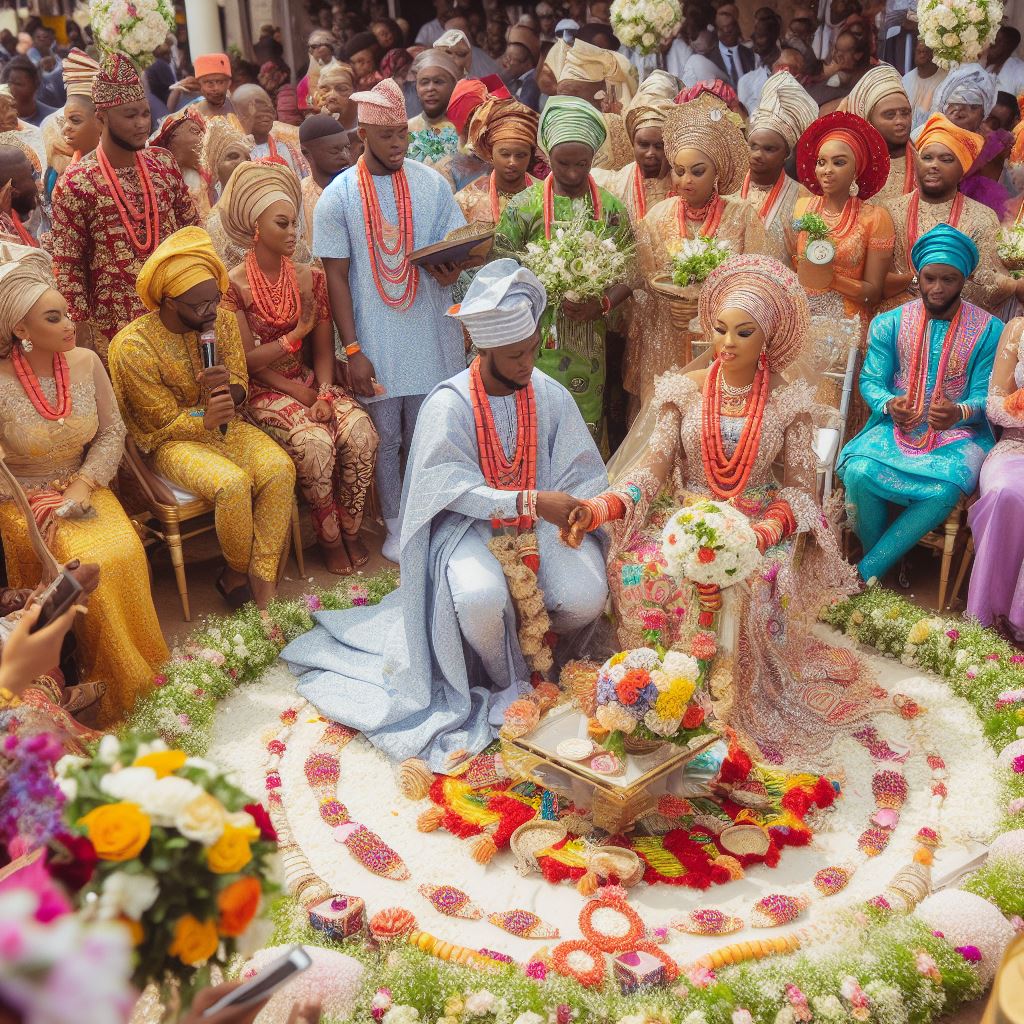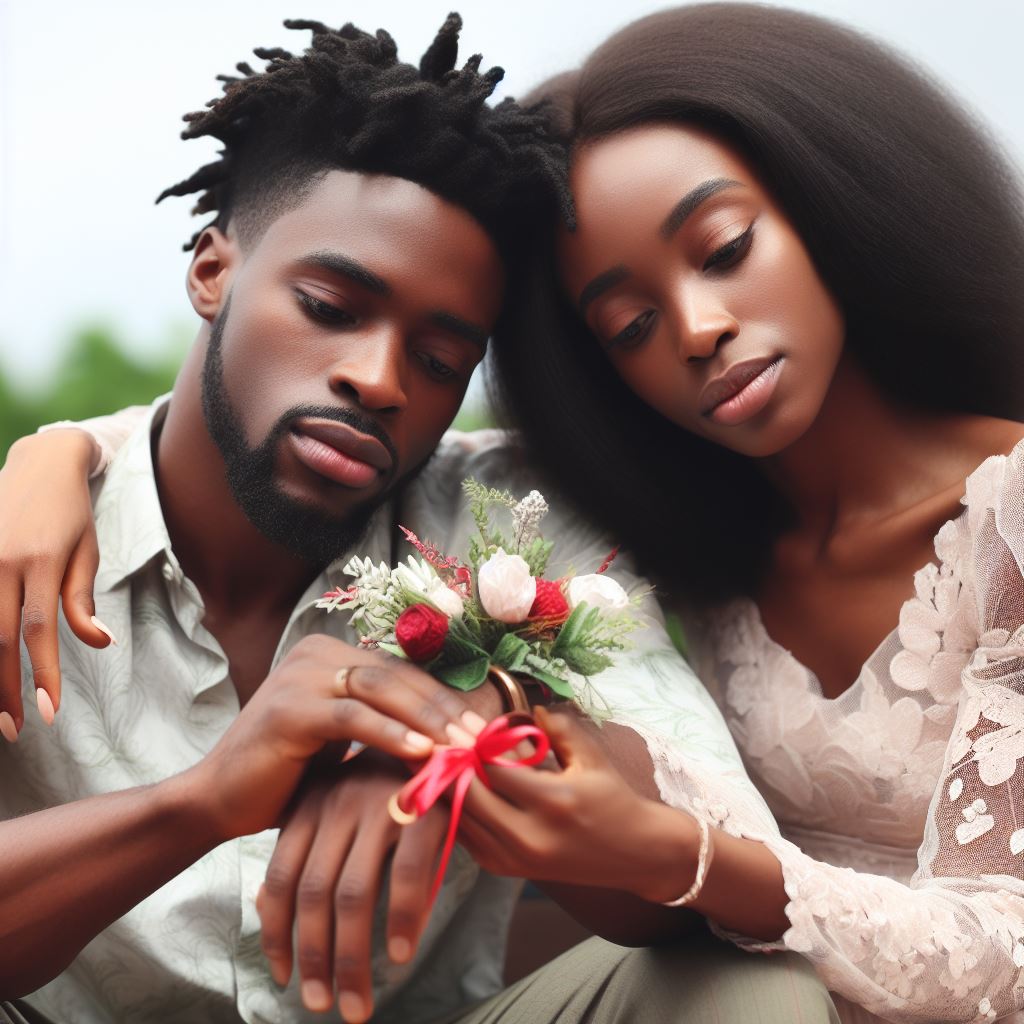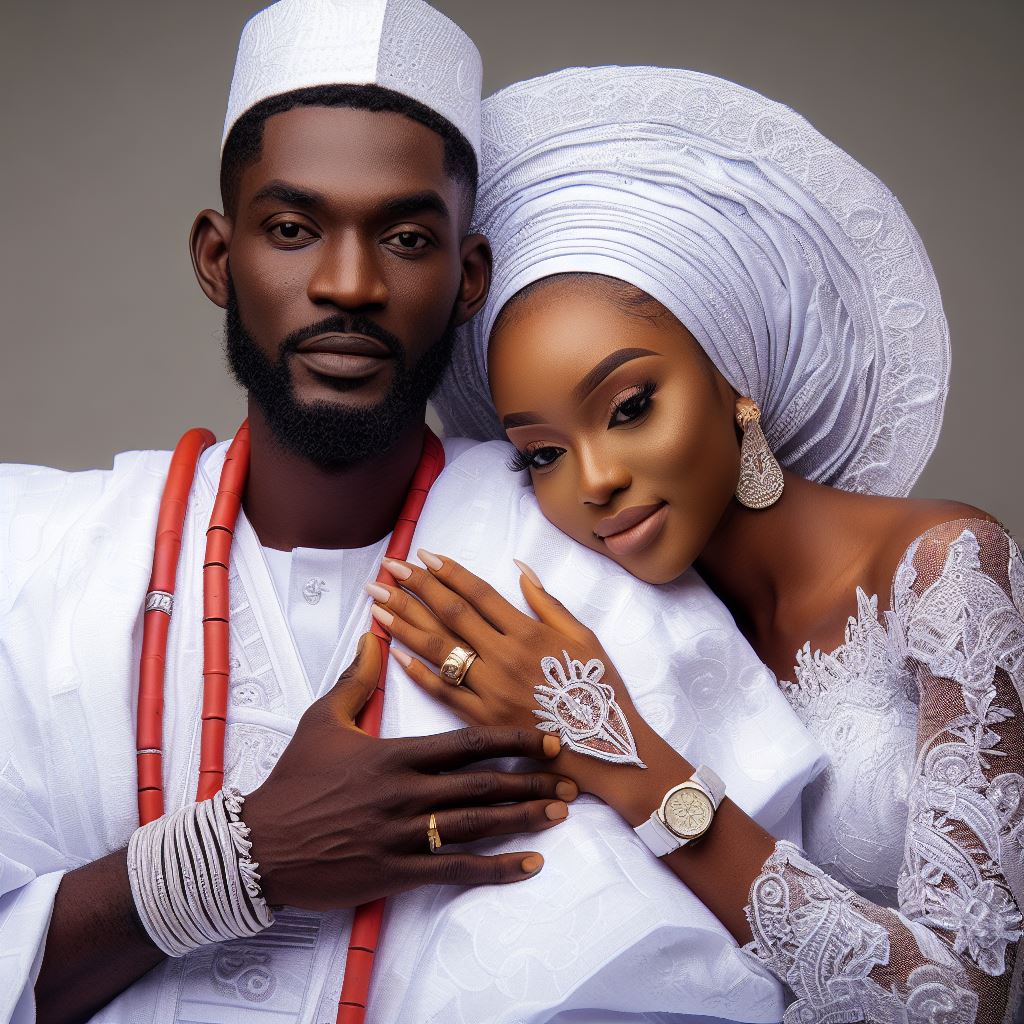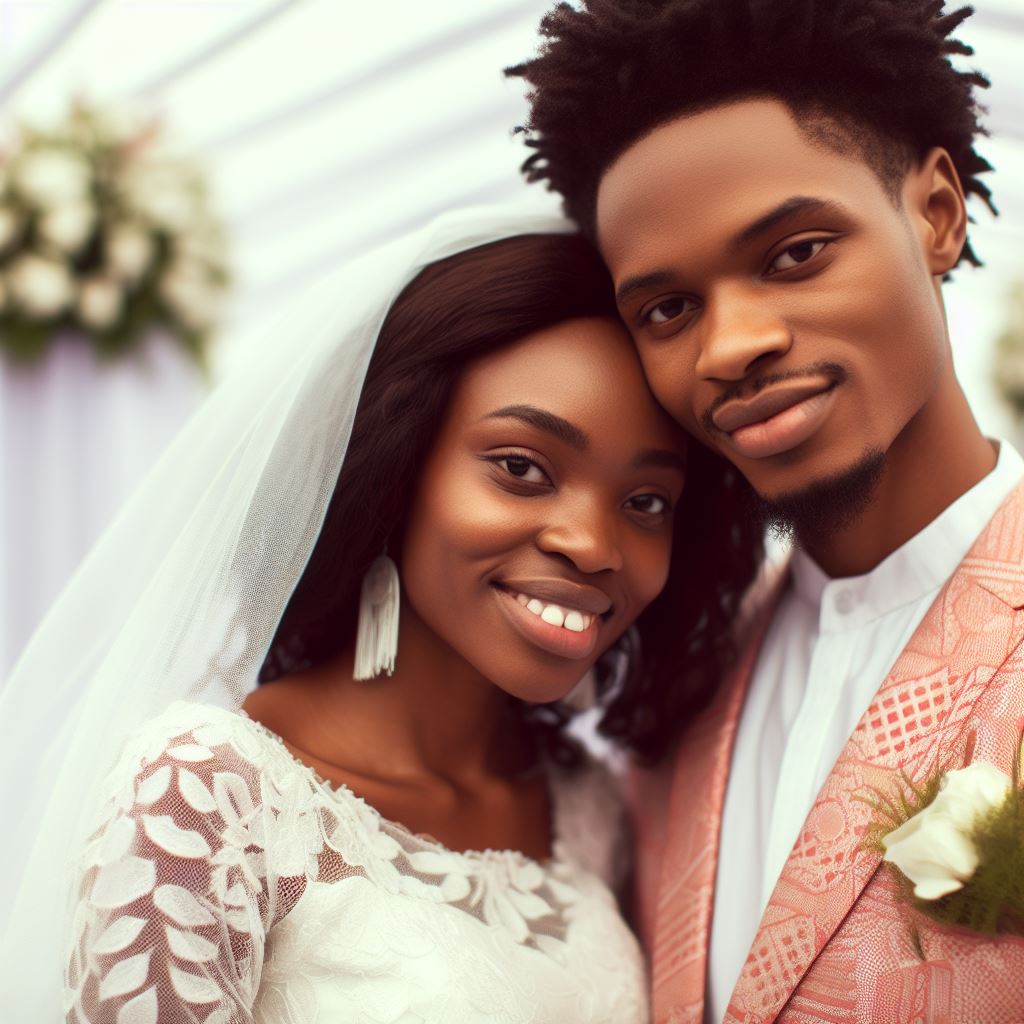Introduction
This blog post explores the cultural importance of celebrating milestones in Nigerian weddings.
In Nigerian culture, marriage is a celebration of love, family, and community. It’s a revered institution, legally and socially binding two individuals for a lifetime.
Nigerian weddings go beyond the couple; they unite families and communities.
From the traditional engagement ceremony to the opulent white wedding, these events are replete with symbolism and traditions.
Each ritual signifies the union’s sanctity and the couple’s commitment. These celebrations not only honor heritage but also strengthen family bonds and community ties.
Through this post, we aim to emphasize the significance of these celebrations, inspiring readers to appreciate and embrace the cultural richness of Nigerian weddings.
It’s not just about two people coming together; it’s about the whole community celebrating a union that signifies love, family, and tradition.
Traditional Pre-Wedding Ceremonies
In Nigeria, traditional pre-wedding ceremonies hold a significant place in the overall wedding celebration.
These ceremonies are steeped in cultural heritage and customs, serving as an important way to honor the traditions of the bride and groom’s families.
Explanation of traditional pre-wedding ceremonies in Nigeria
- Introduction ceremony: This ceremony marks the official introduction of the bride and groom’s families to each other.
- Engagement ceremony: This ceremony signifies the formal agreement of marriage between the couple.
- Traditional engagement: This ceremony involves the exchange of gifts, dowry payment, and blessings from the elders.
Importance of these ceremonies in honoring cultural heritage and customs
These pre-wedding ceremonies play a vital role in preserving Nigerian cultural heritage and customs.
They provide an opportunity for families to showcase their traditions, values, and customs to the younger generation.
- Preservation of cultural heritage: Through these ceremonies, traditional practices, rituals, and beliefs are passed down from one generation to another, ensuring the continuity of Nigerian culture.
- Reinforcement of family bonds: These ceremonies bring families together and strengthen the bond between them. It fosters a sense of unity, belonging, and support within the extended family.
- Celebration of community: Traditional pre-wedding ceremonies often involve the participation of the entire community. This fosters a sense of togetherness, as everyone comes together to celebrate the joyous occasion.
- Expression of identity: These ceremonies allow individuals to express their cultural identity proudly. It serves as a reminder of their roots, values, and customs, creating a strong sense of identity and belonging.
- Symbolism of blessings: Traditional pre-wedding ceremonies involve the blessings and guidance from the elder family members. This symbolizes the passing down of wisdom and the seeking of their blessings for a prosperous and fulfilling marriage.
In review, traditional pre-wedding ceremonies in Nigeria hold immense importance in honoring cultural heritage and customs.
These ceremonies serve as a celebration of Nigerian traditions, fostering a sense of community and belonging.
They ensure the preservation of cultural values, rites, and rituals for future generations.
Wedding Planning
The process of planning a wedding in Nigeria involves several significant tasks and the active participation of both families.
From selecting the perfect venue to managing the budget and creating guest lists, every detail is carefully considered to ensure a memorable celebration.
Overview of the Wedding Planning Process in Nigeria
Planning a wedding in Nigeria is a meticulous process that begins long before the actual event. Couples usually start by setting a wedding date and then move on to identifying the key tasks at hand.
The first step involves selecting a suitable venue for the wedding ceremony and reception.
This decision holds immense significance as the venue sets the tone for the entire event, reflecting the couple’s style and preferences.
Once the venue is secured, attention turns towards budgeting. Weddings in Nigeria can range from small and intimate affairs to grand and elaborate celebrations.
Deciding on a budget enables couples to allocate funds appropriately and prioritize their expenses.
Creating a guest list is another crucial aspect of wedding planning.
It is customary for Nigerian weddings to have large numbers of guests, including family members, friends, and well-wishers.
Careful consideration is given to ensuring that everyone important to the couple is included.
The Significant Role of the Family in Planning Weddings
In Nigerian culture, family plays a central role in wedding planning.
Parents, siblings, and extended family members are actively involved in every aspect, providing support, guidance, and often contributing financially.
The families of both the bride and groom join forces to make the wedding a success.
They collaborate on decision-making, offer advice, and share their knowledge and resources, ensuring that the couple’s dreams are turned into reality.
It is common for the bride’s family to take charge of specific tasks, such as organizing the catering, wedding attire, and decorations.
The groom’s family also has responsibilities, like arranging transportation, handling logistics, and overseeing cultural traditions.
The Various Tasks Involved in Wedding Planning
Wedding planning entails a wide range of tasks that require careful attention to detail.
From choosing the perfect wedding dress and hiring a photographer to arranging entertainment and designing invitations, every element contributes to the overall success of the event.
One of the crucial aspects of wedding planning is managing the guest list.
Couples must ensure they include all their loved ones while staying within the chosen venue’s capacity and budget limitations.
Budgeting is also essential to ensure that all expenses are accounted for, from venue rental to catering, floral arrangements, and entertainment.
Keeping track of costs helps couples make informed decisions and avoid overspending.
A successful Nigerian wedding also involves incorporating cultural traditions and customs.
This includes rituals, music, dance, and traditional attire, which add a unique and meaningful touch to the celebration.
Importance of Involving Both Families in the Wedding Planning Process
Involving both families in the wedding planning process fosters a sense of unity and shared responsibility.
It strengthens the bond between the families and ensures that all perspectives and preferences are considered.
By actively engaging both families, couples can create a wedding that reflects their shared values, traditions, and aspirations.
It also serves as an opportunity for families to come together, build relationships, and celebrate the union of their loved ones.
In general, planning a wedding in Nigeria is an intricate process that emphasizes the significance of family involvement.
From selecting the venue and creating guest lists to managing budgets and incorporating cultural traditions, every step plays a vital role in creating a memorable celebration of love and commitment.
Read: The Significance of Bride Price in Nigerian Marriages
Traditional Wedding Customs
During Nigerian weddings, various cultural traditions are practiced, each with its unique significance in showcasing cultural identity and unity.
Exchange of Gifts
- Gifts are exchanged between the families of the bride and groom as a symbol of goodwill.
- This tradition strengthens the bond between the families and fosters a sense of unity.
- It also demonstrates the willingness of both families to support the couple in their marriage.
Pouring of Libation
- Libation pouring is a customary ritual performed to honor ancestors and seek their blessings.
- An elder usually pours a liquid, often palm wine, on the ground while reciting prayers.
- This act is believed to bring good fortune and ensure the couple’s success in their marriage.
Tying of Traditional Knots
- One of the most prominent customs is the tying of traditional knots during the wedding ceremony.
- These knots are made with cords or palm fronds and represent the joining of two families.
- By tying these knots, the families show their acceptance and support of the couple’s union.
Nigerian weddings, a vibrant tapestry of customs, are a testament to the country’s diverse cultures. These customs celebrate cultural heritage and transmit traditions across generations.
Gift exchanges symbolize family unity and goodwill, reinforcing the commitment to the couple’s union.
Money, jewelry, traditional attire, and household items are exchanged. Pouring libation invokes ancestral blessings and guidance, fostering respect for the past.
It safeguards the couple’s journey with ancestral support. Tying traditional knots visually unites the bride, groom, and their families, emphasizing interconnection and unity.
Family support is paramount, signifying the couple’s journey is not solitary.
Most important, Nigerian wedding customs are more than rituals; they’re cultural pillars that highlight the nation’s identity and unity.
From gifts to libation to traditional knots, these customs emphasize cultural heritage, family bonds, and community unity.
Read: Igbo Marriage Rites: From Introduction to Celebration

Milestones in Nigerian Weddings
Explanation of key milestones in a typical Nigerian wedding
In Nigerian weddings, there are key milestones that mark the progression of the relationship.
These milestones include:
- Introduction: This is the first step where the families meet to get to know each other.
- Engagement: This is the formal announcement of the intent to marry, often marked by a ring.
- Traditional Wedding: This is a ceremony that involves the customs and traditions of the couple’s ethnic group.
- White Wedding: This is a Western-style ceremony conducted in a church or other religious venue.
The importance of celebrating these milestones as a way to honor the progression of the relationship
Celebrating these milestones is important as it honors the progression of the relationship.
Here’s why:
- They represent commitment: Each milestone signifies a higher level of commitment between the couple.
- They strengthen family bonds: The wedding milestones bring both families together, strengthening their bond.
- They provide a sense of achievement: Celebrating these milestones gives the couple a sense of accomplishment and progress.
- They create lasting memories: Each milestone represents a memorable moment that the couple can cherish for a lifetime.
- They uphold cultural traditions: Nigerian weddings are rich in cultural significance, and celebrating these milestones preserves and promotes these traditions.
- They serve as a foundation for the future: By honoring these milestones, couples establish a solid foundation for their married life.
- They bring joy and happiness: Celebrating these milestones is a joyful occasion that brings happiness to the couple and their loved ones.
- They symbolize love and unity: Each milestone is a symbol of the couple’s love and their unity as they embark on their journey together.
In essence, celebrating the milestones in Nigerian weddings is crucial as it signifies the progress of the relationship, strengthens family bonds, upholds cultural traditions, and creates lasting memories.
It is a way to honor the commitment between the couple and set the foundation for a happy and successful married life.
Read: Planning a Yoruba Marriage Function: Top Tips
Symbolism and Cultural Significance
In Nigerian weddings, symbolism plays a significant role, representing the rich cultural heritage and traditions.
This section will explore various symbolic elements unique to Nigerian weddings, including the meaning behind colors, attire, and accessories, as well as discuss the cultural significance of these symbols.
1. Exploration of Symbolic Elements in Nigerian Weddings
- Beads: The use of beads in Nigerian weddings symbolize wealth, social status, and beauty.
- Gele: The intricate headgear worn by Nigerian brides represents elegance, femininity, and marital status.
- Kente fabric: This traditional Ghanaian cloth, often incorporated into Nigerian weddings, signifies cultural unity and heritage.
- Aso Oke: A handwoven fabric used in bridal outfits symbolizes royalty, prestige, and celebration.
2. Explanations of Symbolism Behind Colors, Attire, and Accessories
- Red: The color red symbolizes love, passion, and fertility, making it a popular choice for Nigerian brides.
- Gold: Associated with wealth and prosperity, gold accents are often used in bridal attire and accessories.
- Coral beads: Worn by Nigerian brides, coral beads symbolize good luck, protection, and fertility.
- Wedding rings: These rings symbolize eternal love, commitment, and unity between the couple.
3. Discussion of the Cultural Significance of these Symbols
- Family ties: Nigerian weddings emphasize the importance of family, with symbolism deeply rooted in ancestral connections.
- Community involvement: Nigerian weddings are a communal affair, symbolizing the support, unity, and blessings of the extended family and community.
- Preservation of traditions: The use of symbolic elements in Nigerian weddings helps to preserve centuries-old cultural practices and pass them down to future generations.
- Bridging the gap between the old and the new: Symbolism in Nigerian weddings helps blend traditional customs with modern influences, creating a harmonious balance.
4. Importance of symbolism in Nigerian weddings
- Cultural pride: Symbolic elements in Nigerian weddings showcase the richness and diversity of Nigerian culture, fostering a sense of pride and identity.
- Emotional connection: By incorporating symbolic elements, Nigerian couples forge a deeper emotional connection to their cultural heritage and ancestors.
- Meaningful celebrations: Symbolism adds depth and meaning to wedding ceremonies, making them more than just a union between two individuals but a celebration of Nigerian traditions.
- Unity and continuity: Symbolism in Nigerian weddings reinforces the unity between families and the continuity of cultural practices.
5. Future trends in symbolism in Nigerian weddings
- Fusion weddings: With the rise of globalization, Nigerian weddings are embracing elements from other cultures while maintaining their symbolic significance.
- Personalized symbolism: Couples are now incorporating symbols that hold personal meaning to them, adding a unique touch to their wedding ceremonies.
In fact, symbolism holds great importance in Nigerian weddings, representing cultural heritage, values, and aspirations.
The exploration of symbolic elements, understanding the meaning behind colors, attire, and accessories, and the recognition of cultural significance allows Nigerian weddings to embrace their traditions while adapting to contemporary influences.
By incorporating symbolism, Nigerian couples create a vibrant and meaningful celebration of love, family, and culture.
Read: Nigerian Wedding Traditions: A Comprehensive Guide
Celebrating Marriage Milestones
Marriage is a sacred institution, and celebrating milestones is essential in recognizing and appreciating the journey.
Here’s why it’s important:
Importance of Celebrating Each Milestone in a Marriage
- Reflects gratitude for each milestone achieved and the growth as a couple.
- Strengthens the bond between partners, reminding them of their commitment and love.
- Allows for reflection on challenges overcome, promoting resilience and a positive outlook.
- Provides an opportunity to reconnect, communicate, and reaffirm vows to each other.
Now that we understand the importance, let’s explore exciting ways to celebrate marriage milestones:
Suggestions for Celebrating Milestones
Throwing Celebration Parties
Host a gathering of close friends and family to rejoice in the achievement and honor the union.
Taking Romantic Trips
Plan a vacation or a romantic getaway to mark the milestone with unforgettable experiences.
Exchanging Thoughtful Gifts
Surprise your partner with a meaningful gift that symbolizes your love and memories together.
Celebrating milestones in a marriage not only brings joy and happiness but also has several benefits:
Benefits of Celebrating Milestones for Marital Bliss
Renews Excitement and Passion
By celebrating milestones, couples reignite the spark and keep the excitement alive in their relationship.
Strengthens Emotional Connection
Sharing moments of celebration deepens the emotional connection, fostering a stronger bond.
Fosters Appreciation
Celebrating milestones reminds partners to appreciate each other and the journey they have embarked upon.
Creates Lasting Memories
Marking milestones with special celebrations creates beautiful memories that couples can cherish forever.
Helps Overcome Challenges
During difficult times, reflecting on past milestones provides motivation and strength to overcome hurdles.
In short, celebrating marriage milestones is an important aspect of a successful and fulfilling relationship.
It signifies gratitude, strengthens bonds, and creates lasting memories. So, make sure to mark each milestone with joy, love, and appreciation!
Conclusion
Celebrating milestones in Nigerian weddings holds immense importance in preserving traditions, strengthening relationships, and fostering a sense of unity within the community.
By acknowledging and honoring these milestones, couples not only express their love and commitment but also create lasting memories for themselves and their loved ones.
It is crucial for readers to embrace and appreciate their own marriage milestones, regardless of their cultural background, as they serve as reminders of the journey they have embarked on together.
Furthermore, these milestones provide an opportunity for reflection, growth, and gratitude, allowing couples to create a solid foundation for their future.
Marriage is not just a union between two individuals, but a celebration of love, culture, and the coming together of families.
Through their distinct customs and rituals, Nigerian weddings showcase the rich heritage and values that are deeply ingrained in the society.
It is our responsibility to cherish and uphold these traditions, as they symbolize the sacred bond that marriage signifies in Nigerian culture.
By valuing and respecting the significance of marriage in our lives, we can ensure that these beautiful customs continue to be passed down to future generations.
Thus, let us actively celebrate and honor the milestones in Nigerian weddings, not only as a mark of joy and festivity but as a testament to the enduring power of love and commitment.




